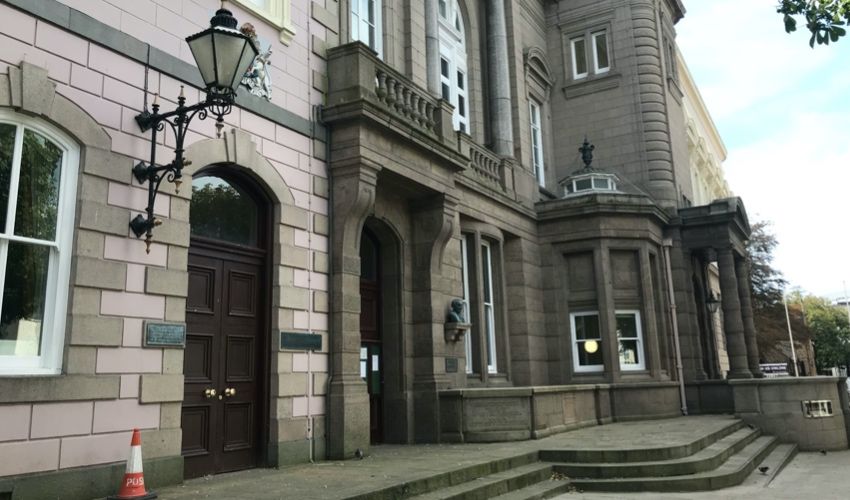


The defence for a man accused of murdering a woman three-and-a-half years ago emphasised that “there is no direct evidence of a killing" as the trial entered its final stages today.
Jamie Lee Warn is accused of murdering Hungary-born Zsuzsanna Besenyei on 10 May 2018, before disposing of her body at Stinky Bay days later as part of what the prosecution says is an "elaborate cover-up."
Opening the jury trial in the Royal Court last week, Crown Advocate Simon Thomas claimed Mr Warn had disposed of the body in the early hours of Monday 14 May 2018, having held it in the boot of her car, and then left her car at the beach by La Haule slipway.
Since then, the jury has heard from a number of witnesses, including a mobile phone data analyst, a doctor, and Ms Besenyei's former boyfriend, and viewed evidence including CCTV footage. Mr Warn did not take to the stand to give evidence.
This afternoon, both the prosecution and defence gave their closing arguments.
Advocate Thomas claimed that " cell site data pinpoints [Mr Warn's] mobile phone down in Stinky bay between 01:00 and 01:20", and asked the jury "what could he possibly have been doing at this remote bay in the middle of the night" except disposing of the body "at the very location it was found."
Alleging Mr Warn had left the Ms Besenyei's car at the beach by La Haule slipway, he said he had "created the fiction she killed herself by leaving her car on the beach", adding that "the callousness of what the defendant did is entirely consistent with the Crown's case" that he intended to kill her or at least cause serious harm.
Advocate Thomas concluded that Mr Warn's "arrogance has been his undoing", and that he had "unwittingly left a trail of evidence that proves he’s guilty, and that he’s guilty of murder.”
Defending Mr Warn, Advocate James Bell addressed the prosecution's "circumstantial" evidence and told the jury that "no cause of death has been determined."
He continued: "There are no specific areas of injury that would confirm any deliberate act of assault. There is no direct evidence of a killing and indeed from the post mortem, no direct evidence as to how she died."
Advocate Bell said that a doctor who had presented medical evidence to the court "confirmed he has not been able to reach a medical cause of death" for Ms Besenyei, and that "the only conclusive evidence of injury is a tiny fracture to the larynx, which occurred at least one day prior to death."
He asked the jury: "Although he may have identified areas of concern, this is a far cry from being sure as to the cause of death, and if the expert cannot be sure of the cause of death, how can you be sure?"
Querying the prosecution's use of mobile cell site data to pin down what they alleged were Warn's movements, Advocate Bell highlighted what he called "limitations" of the method. He said that the records could only show where the phone was within the "coverage area" of a certain mast, and that the cell sites "cannot establish if the mobile phone was at a particular address" and "cannot establish who was using the mobile phone."
He also asked the jury whether they could be sure the CCTV evidence they had been shown by the prosecution showed Mr Warn, cautioning them to be wary of "confirmation bias", and claiming that timestamps on two pieces of footage from 10 May did not correlate.
He alleged that the prosecution had not "established a motive to support their case", and that texts between Ms Besenyei and Mr Warn showed the pair had a "good relationship" and "Mr Warn to be mild-mannered."
"An argument over £150 would be a surprising motive for murder. There is no suggestion in any of the messages that either party wanted their friendship to end," he said.
"There is no reason as to why Mr Warn should want to murder her. So there is no evidence of a motive for murder, and when the prosecution case depends entirely on circumstantial evidence, the absence of a motive must raise doubts."
Concluding, Advocate Bell told the jury that "there is no evidence establishing a location at which she can be said to be killed. There is no evidence that Mr Warn's flat had been cleaned up.
"There is no evidence that Ms Besenyei's body had been held in the boot of a car. There is no forensic evidence of her on him, or him on her.
"And, remember, it is only if you are sure of guilt that you can convict, and I suggest that on the evidence that you have heard, you are likely to be less than sure of guilt.
"In conclusion, I invite you to find Mr Warn not guilty of murder and manslaughter."
Commissioner Sir Michael Birt has been presiding over the trial, and is due to give his summing up comments on Thursday morning before the jury retires.
For legal reasons, Bailiwick Express does not accept comments on court stories.
Comments
Comments on this story express the views of the commentator only, not Bailiwick Publishing. We are unable to guarantee the accuracy of any of those comments.